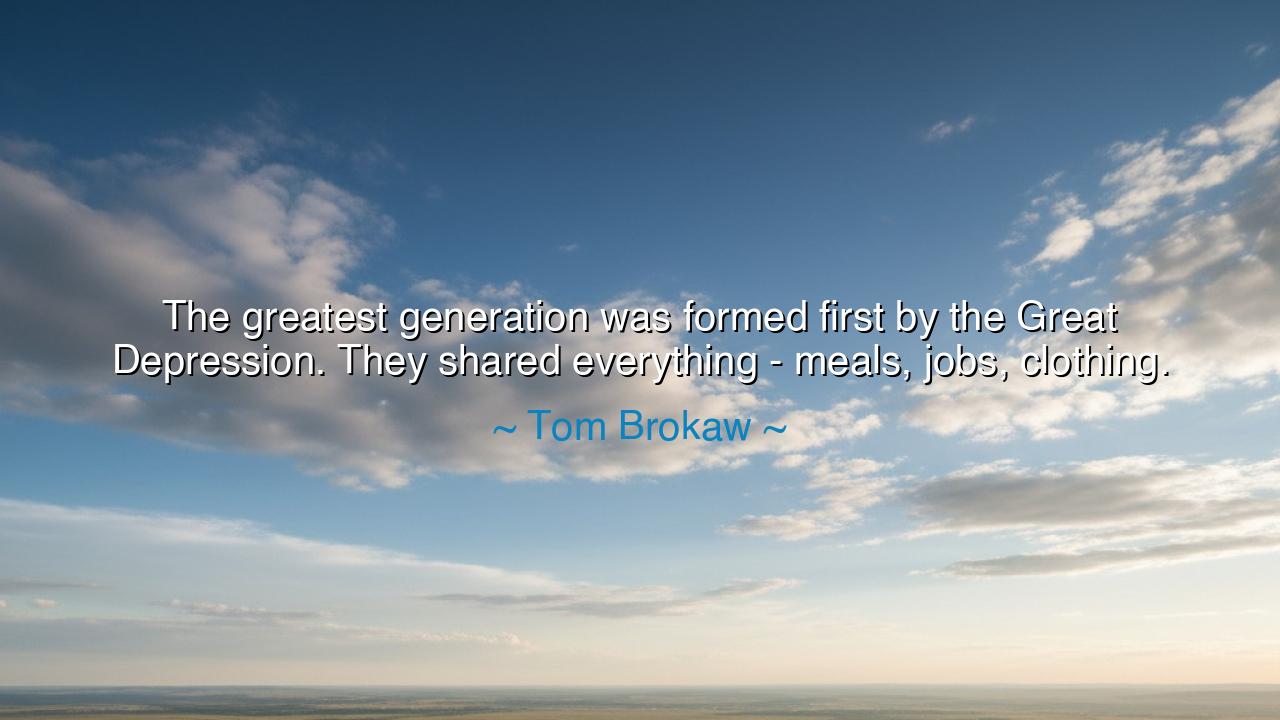
The greatest generation was formed first by the Great Depression.
The greatest generation was formed first by the Great Depression. They shared everything - meals, jobs, clothing.






In the words of Tom Brokaw, “The greatest generation was formed first by the Great Depression. They shared everything — meals, jobs, clothing.” These words carry the weight of remembrance, the reverence of a man who looked upon those who came before him and saw not only endurance, but greatness born of hardship. In this single sentence, Brokaw captures a truth that the ancients themselves would have recognized: that adversity is the forge of virtue, and that shared suffering gives rise to shared strength. The Great Depression, though an age of despair, became the crucible in which character was refined and compassion reborn.
Tom Brokaw, the journalist and chronicler of American spirit, gave the title The Greatest Generation to those who lived through the twin trials of the Great Depression and the Second World War. He saw in them something eternal — a spirit of unity and humility that hardship alone can teach. In their time, money was scarce, hunger was familiar, and uncertainty was constant. Yet instead of collapsing under the weight of loss, they turned inward and toward one another. They shared everything — not because they had plenty, but because they had each other. It was in this fellowship of necessity that they rediscovered the ancient wisdom: that the wealth of a people is not in what they possess, but in what they give.
In ancient Greece, there was a saying: “Character is fate.” The men and women of the Great Depression proved this true. Their character, forged in poverty, became the foundation of their destiny. When the world once again called upon them — this time to defend freedom itself in the fires of World War II — they answered with courage born from endurance. They had already learned to sacrifice, to labor without complaint, to place duty above desire. Thus, they became the greatest generation, not by conquest or wealth, but by the quiet heroism of perseverance and the nobility of shared struggle.
Consider the story of Dorothea Lange’s photograph, “Migrant Mother.” It shows a woman, face etched with exhaustion, surrounded by her children, her eyes gazing into an uncertain future. That image became an icon not of weakness, but of strength. It captured the heart of a generation that refused to yield. The mother, though destitute, shared what little she had; she protected her children with both her body and her spirit. She was not unique — she was emblematic. Across towns and farms, people exchanged bread, mended each other’s clothes, and found solace in community. Their shared poverty became shared purpose.
Brokaw’s words remind us that hardship, though cruel, has the power to unite where abundance divides. In times of plenty, people often grow isolated in comfort, but in times of struggle, they rediscover their bond. The Depression stripped away the illusions of independence and revealed the truth of interdependence — that survival, and indeed greatness, is found in unity. It is a lesson as old as civilization itself: the tribe survives when each member cares for the other, when strength is given freely and compassion becomes law.
The lesson here, for all who live in more prosperous times, is clear. Comfort is not the teacher that hardship is. Do not wait for famine to learn generosity, nor for struggle to remember gratitude. Let the memory of that generation live in action — in kindness, in humility, in the refusal to forget the value of community. For greatness does not arise in the abundance of possessions, but in the abundance of spirit. If you wish to honor them, then share — share your time, your compassion, your hope — as they once shared their bread.
So, children of the modern age, take heed of Tom Brokaw’s words. The world may change, but the laws of the soul remain the same: adversity refines, unity strengthens, and generosity redeems. The greatest generation earned their name not because they triumphed over others, but because they triumphed over despair — together. Their story is a sacred inheritance, reminding us that greatness is not found in ease, but in endurance; not in isolation, but in the shared heartbeat of those who refuse to let one another fall.
Thus spoke Brokaw, the witness to a vanished age, yet his message endures: that the measure of a people is not in what they build in prosperity, but in what they preserve in hardship — their humanity, their compassion, and their faith in one another. And in remembering that, we remember the path to greatness ourselves.






AAdministratorAdministrator
Welcome, honored guests. Please leave a comment, we will respond soon